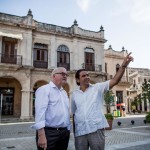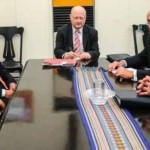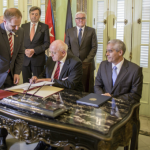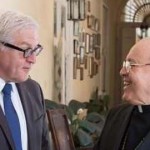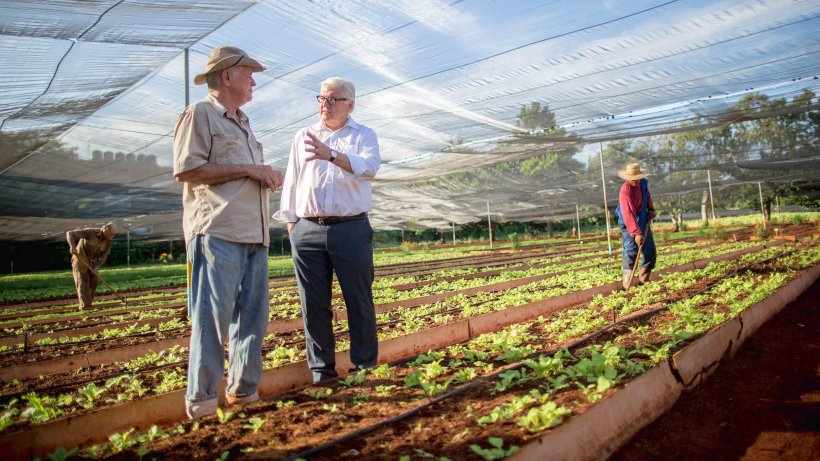
German minister is pleased by results of his visit to Cuba
German Foreign Minister Frank-Walter Steinmeier is back in his country, assessing the results of his recent (July 16-17) trip to Cuba. Judging from public comments he has made since, the immediate results were modest — but he sees room for improvement.
“I believe that this is the right time to readjust our relations,” Steinmeier wrote in the German Foreign Ministry’s website. “In recent weeks and months, we have worked toward the ambitious goal of adopting an agreement that will form the basis of everything that is to come.”
It is a foundation agreement, he continued, “with which we have also set up a political mechanism through which we will maintain a regular dialogue over the upcoming months and years.”
For a start, two agreements were signed by Havana and Berlin during Steinmeier’s visit to the island. One was on political cooperation, the other on economic and cultural issues.
There’s much more to be accomplished, Steinmeier told the German media upon his return.
“During the talks it became clear that there’s a need for [German] companies that will invest in pharmaceuticals, medical technology, logistics and infrastructure and, above all, agriculture,” Steinmeier told Mitteldeutscher Rundfunk.
“We see that deficiencies [in Cuba] are a major obstacle to further development. There is a lack of everything, there is a lack of fertilizers, of equipment, and a lack — surprising though it may seem — of manpower, especially in the countryside.”
Steinmeier saw that situation firsthand when he toured Vivero Alamar, an urban farm in Havana sponsored by German donations to the World Hunger Aid Project.
Germany has pledged to assist in the modernization of agriculture. Also, both countries want to work together in developing the energy sector with a focus on renewable energy.
“In Cuba, Germany is known for its economic strength and the quality of its products,” Steinmeier said, according to Deutschland Funk. “Raúl Castro wants to attract significantly more interest from the German economy.” Castro and Steinmeier spent almost two hours discussing ways in which Cuba can open to foreign investment.
“One must encourage the Cuban government to continue this reassuring opening process,” the German minister commented. For too long, Germany and Cuba were guilty of mutism, of a reluctance to talk to each other, he said.
Civil rights were part of the conversation with Castro, Steinmeier said, without elaborating. How Havana deals with views contrary to those of its one-party communist system is a concern to Germany and other countries.
During his stay in Havana, Steinmeier met privately with Cardinal Jaime Ortega y Alamino, who helped arrange a release of prisoners in December 2011, before the arrival in Cuba of Pope Benedict XVI.
“We will continue to hold different views on our attitudes to democracy and human rights concerns,” Steinmeier told the press. “But right now we want to try to get past the phase of mutism.” A commitment to respect civil and human rights was included in one of the two agreements signed last week, the press reported.
Castro assured Steinmeier that Cuba would continue to develop its relations with Germany and a broad range of other nations. Likely alluding to Cuba’s reliance on the Soviet Union and previously on the United States, Castro told his German visitor that “we have too often in the past made the mistake of always relying only on one single partner.”
The meeting with Castro had not been on the minister’s official schedule, but in the end Steinmeier got to meet two Castros, the other being Fidel Castro Díaz-Balart, Raúl’s 65-year-old nephew, who was present at a reception at the German Ambassador’s residence.
Ever mindful of retaining control of its sovereignty and domestic policy, Havana is moving cautiously toward relations with the rest of the world and new approaches to foreign policy. Risks must be taken, the German diplomat believes.
As Steinmeier sees it, “Obama said that Cuba’s 50-year isolation had actually led to nothing, that we need to do something new. I have the impression — and if you’re there, with your eyes wide open, walking through the capital, you can see it — even in Cuba ‘new’ is risky.”
[Photo at top of Steinmeier visiting an urban farm in Havana.]

